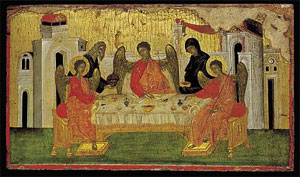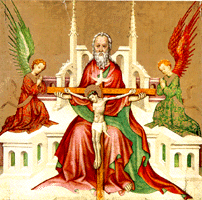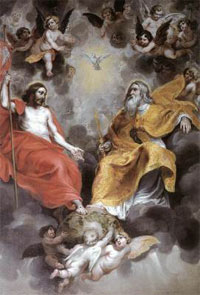So Far, So Near
Guest essay by David Buschart. W. David Buschart serves as Associate Dean and Professor of Theology at Denver Seminary (Colorado), and as a theological consultant to churches and organizations. His forthcoming book is called Exploring Protestant Traditions: An Invitation to Theological Hospitality (InterVarsity Press).
For Sunday June 11, 2006
Trinity Sunday 2006
Lectionary Readings (Revised Common Lectionary, Year B)
Isaiah 6:1–8
Psalm 29
Romans 8:12–17
John 3:1–16
 |
The Hospitality of Abraham. |
As I write, my family and I are enjoying a visit from a dear friend who has served the international Christian mission community for several decades. Jill has traveled in 40 countries providing in-person, spiritual, psychological and relational care. Earlier this week she told us a remarkable story.
There is a church in Toronto that has a wonderful ministry to immigrants from a Middle Eastern nation that is predominantly Muslim. Recently, a woman who regularly attends began to take out her cell phone during Sunday morning worship services. A number of people found this quite distracting, and, after some deliberation, the pastor decided that he needed to ask her not to use her cell phone during services. Upon meeting with her she assured him that she was not talking on her cell phone. Rather, she was holding the phone in such a way that her husband, who for work-related reasons had to move back to their home country, could listen to the service, particularly the sermon, over the telephone. He was a Muslim who was very interested in the new religious experience his wife was having, and he was excited to share in some of her experience, even though he was half-way around the planet. She told the pastor that sharing the church services via cell phone helped them to feel a sense of closeness despite their geographic separation. (By the way, the pastor gladly invited her to continue to use her cell phone during worship services.) This is but one way in which technology can bring someone close to us who is otherwise so far away.
 |
Trinity—Jesus as Son, Crucified one. |
In ways that transcend technology and to a degree not possible for mere mortals, the Triune God is both far and near. And, we can praise and thank Him that He is both. Theologians describe this as the transcendence and immanence of God, and in the arcane language of the eastern Orthodox tradition they insist that while we can never know God in his ultimate "essence," we can know his "energies." The lectionary Scriptures for Trinity Sunday speak to both of these.
“I saw the Lord seated on a throne,” writes the prophet Isaiah, “high and exalted” (Is. 6:1). This Lord dwells in a seraph-filled realm that is far removed from the pedestrian realm that you and I occupy. And, unlike we who are “people of unclean lips” (Is. 6:5), He is “holy, holy, holy” (Is. 6:3). Yet, God made it possible for Isaiah to see the Lord seated on the throne. And, despite the moral distance that separated Isaiah and his people from “the Lord Almighty” (Is. 6:3), through divine intervention Isaiah—a man “ruined” and “of unclean lips” (Is. 6:5)—was transformed into a person who was both willing and able to be the voice of this Lord (Is. 6:8–9).
“Ascribe to the Lord, you heavenly beings, ascribe to the Lord glory and strength. Ascribe to the Lord the glory due his name; worship the Lord in the splendor of his holiness” (Ps. 29:1-2). The Lord “thunders”; He is “powerful” and “majestic”; He “strikes with flashes of lightening”; He “shakes the dessert” and “twists the oaks” (Ps. 29:3–5, 7–9). In response, we can once again listen to Isaiah, who inquires on God’s behalf, “With whom will you compare me or count me equal? To whom will you liken me that we may be compared?” (Is. 46:5). Yet, rather than crying out in terror, as might seem reasonable, the Lord’s people proclaim “Glory!” (Ps. 29:9), for they know that this is a God who also “gives strength to his people . . . [who] blesses his people with peace” (Ps. 29). Though they may not see God literally or directly, they see his work and they see him with the eyes of faith.
 |
Holy Trinity. |
When the Son of God comes “from God” (Jn. 3:2), He confronts respectful listeners with the fact that they do not believe what He says about “earthly things”—what makes them think that they will grasp or believe when He points them toward the realities of his realm, “heavenly things” (Jn. 3:12–13)? As John would later write, the Son is “from above,” while those to whom He came are “from below” (Jn. 8:23). In order to be genuinely near the Lord Almighty, Isaiah’s lips needed the touch of “a live coal” (Is. 6:6); in order for anyone to even see the Kingdom of God, Jesus says, they must be “born again” (Jn. 3:3). Yet, because of God’s love, precisely this is possible (Jn. 3:16). The Lord of heaven came from heaven, became one of us, and gave himself for those in need of nothing less than re-birth. The God of highest heaven could not have come any closer.
Yet, there is more. Our “sinful nature” (Rom. 8:12) persists, and as a result God is so far away that, unless there is a change, “you will die” (Rom. 8:13). The people “of unclean lips,” the people “from below,” the people whose lives are marked by “misdeeds of the body” (Rom. 8:13), are in need of nothing less than a touch not just from “a live coal” but from God himself. Having once shattered, through the incarnation and atonement in Christ, the distance between God and human beings, God comes again—for “if by the Spirit you put to death the misdeeds of the body, you will live. For those who are lead by the Spirit of God are children of God” (Rom. 8:13–14). We are moved from the position of slave to the position of child (Rom. 8:15). We can call the Lord God Almighty “Father,” and God the Spirit will directly confirm for us that the Lord is indeed our Father (Rom. 8:15–16).
It would be a mistake on Trinity Sunday, or any other day, to ascribe God’s distance from us and nearness to us to the various persons of the Godhead. It would be a mistake, for example, to identify God the Father alone with the high and lofty God of Isaiah or to identify the Holy Spirit alone with the God who is near. Rather, we can and ought to worship and rest in the fact that the Triune God—Father, Son, and Holy Spirit—is so far, so near. God the Father is enthroned in heaven, and He is our “Abba,” loving Father. Jesus is “from above,” and He is the one with whom we are “co-heirs” (Rom. 8:17). The Spirit is the Holy Spirit of God, and yet He dwells in and with us.
For further reflection:
* When have you experienced God as especially remote? Near? Can you discern why?
* How do we hold together God "so far" and "so near" without losing either?
* What are the consequences of stressing only the transcendence or immanence of God?
* What are the implications of the Holy Trinity for human community?





